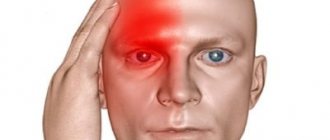Insomnia is a common pathology that leads to a significant decrease in quality of life and can give rise to various diseases. Not all patients know which doctor treats insomnia, so they are in no hurry to seek medical help and try to cope with the problem on their own.
If the situation begins to get out of control and self-medication does not bring results, then you should first contact a therapist. Only after this can you go for further examinations and specialized consultations with specialized specialists.
Which specialists will help?
Dysfunctions of the nervous system can be caused by a variety of reasons and have completely different manifestations. Specialists dealing with such diseases are divided into 3 main categories: neurologist, psychotherapist and psychiatrist. All of them must have a diploma of higher medical education, after which they must complete an internship within 2 or 3 years and begin independent practice.
Neurologist
A neurologist is a specialist whose field of activity covers all areas of neurology: prevention, examination and influence on the central and peripheral parts of the nervous system. Neurology studies in detail the anatomy, functioning and treatment of the nervous system.
The term “neuropathologist,” which was actively used in Soviet medicine, also belongs to this category. Now it is considered outdated and incorrect, but sometimes out of habit it is used by individual doctors.
Psychotherapist
Psychotherapist - a doctor who deals with patients with mild or moderate mental disorders is called a psychotherapist. A prerequisite for his practice is a detailed study of psychotherapy.
The psychotherapist's field of activity is mental disorders caused by childhood traumas, severe stress, or due to genetic predisposition. As a rule, patients treated by this doctor do not have organic or anatomical brain injuries, but exhibit only psychological disorders.
The question often arises as to whether there are differences between a psychologist and a psychotherapist. There is a difference, and it lies in the fact that a psychologist does not have a higher medical education, and therefore can only advise patients, while a psychotherapist has the right to make a diagnosis and prescribe a course of treatment.
Psychiatrist
The scope of his activity is almost the same as that of a psychotherapist, but the psychiatrist also works with cases of the highest severity. A doctor who has studied for 6 years at a medical university and spent 2 years in an internship or is engaged in the activities of a graduate student has the right to work as a psychiatrist.
If a psychotherapist’s treatment methods are predominantly based on speech, and medications are used only as an aid, then the psychiatrist primarily carries out drug treatment and active non-drug therapy. Such methods cause stimulation of brain activity.
Neurosis
Neurosis is a psycho-emotional state accompanied by various manifestations of psychogenic disorders that have a reversible but protracted course.
The significant prevalence of this pathology determines the relevance of the question of which doctor to contact with neurosis and how to prevent its development. In the modern world, there is a sharp increase in cases of mental disorders, which is facilitated by a number of factors, such as
:
- accelerated pace of life;
- heavy workload (chronic fatigue);
- insufficient and inadequate rest;
- constant stress and conflicts;
- constant psycho-emotional stress;
- lack of financial resources;
- unemployment;
- poor nutrition, fast food snacks provoke in the body a lack of necessary elements for the normal functioning of the nervous system (potassium, magnesium, B vitamins);
- long-term illnesses can cause the development and progression of mental disorders;
- hormonal surges (birth of a child, puberty, menopause);
- intellectual overstrain.
A doctor can diagnose various states of neurosis (fear, obsession, hysteria) in people of all age categories and social classes.
Timely assistance from a highly qualified specialist will make it possible to avoid the progression of the pathological state of the human psyche. People with neurosis consult a psychiatrist, a neurologist and a good psychologist.
In most cases, a person with psycho-emotional exhaustion requires the help of loved ones, since he may not be aware of the presence of this problem, which further aggravates the situation.
How to recognize neurosis in the initial stages of development?
The clinical picture of neurosis is divided into symptoms of a psychogenic nature and somatic disorders that arise as a consequence of a person’s unstable psycho-emotional state.
Psychogenic symptoms
A doctor who treats neuroses, that is, a psychotherapist, determines its presence by the following criteria:
- increased irritability and aggressiveness, manifested against the background of complete well-being;
- indecisiveness and low self-esteem;
- intolerance to loud sounds, bright light and temperature fluctuations (cold, heat);
- tearfulness;
- state of obsessions;
- prolonged depression is one of the common reasons to find out which doctor treats neurosis;
- a state of constant anxiety and fear;
- inadequate distribution of life priorities and preferences;
- isolation and ignoring other people;
- chronic fatigue, rapid fatigue that persists after proper rest and sleep;
- frequent hysterical and unfounded attacks.
The presence of at least several of the listed psycho-emotional conditions is an indication for contacting an appropriate specialist. A doctor specializing in neuroses is called a psychiatrist or psychotherapist. Many patients may simply be afraid of visiting this doctor, so they deny the existence of a problem and the situation gets worse.
Somatic manifestations of a disturbed psyche
Somatic symptoms are noted as a secondary manifestation of neurosis and cause a deterioration in a person’s physical condition. If a patient has mental disorders, the doctor notes the following symptoms:
- significant fatigue when performing minor mental or physical activity;
- lack of appetite and complete refusal to eat (psychogenic anorexia);
- constant desire to eat something (bulimia);
- the occurrence of pain in the heart area against the background of normal cardiography results in a situation where the doctor treats cardiac neurosis without the presence of functional abnormalities;
- frequent headaches and dizziness;
- discomfort in the abdominal cavity with a predominance of digestive disorders in the form of diarrhea;
- decreased sexual desire;
- sleep disorders, which are manifested by insomnia, nightmares or a state of pathologically deep sleep;
- excessive sweating.
Identifying mental disorders or psycho-emotional trauma in childhood is somewhat more difficult. In children, neuroses are treated by a pediatric psychologist or psychiatrist, which in most cases manifests itself as the sudden development of enuresis.
This symptom, observed regularly, should alert parents and become a reason for consultation with a highly qualified specialist.
Mental disorders at an early age can have a very detrimental effect on the child’s subsequent life, so medical care from a doctor is very important.
Principles of treatment
To treat neurosis, consult a psychotherapist or psychologist.
Some patients visit a neurologist, which is not always considered correct, since this doctor is more qualified in diseases of the nervous system, and neurosis is classified as a mental disorder. A neurologist will provide the most adequate assistance in the event of diseases of the central nervous system or its peripheral parts with the manifestation of symptoms of mental disorders.
The most important aspect in the work of a psychotherapist is considered to be the ability to conduct conversations when identifying one or another form of neurosis.
It is a conversation with a highly qualified doctor in the field of psychiatry that helps the patient to realize the existence of a problem and agree to its elimination, which will greatly facilitate the restoration of psycho-emotional health in case of neurosis.
This process takes a long time and requires the following methods and means:
- in adults, neuroses are treated by a psychiatrist using medication (antidepressants and drugs that improve the functioning of neurotransmitters), which reduces mental arousal, normalizes sleep, restores appetite, and slows down the perception of irritating factors;
- Spa treatment;
- a set of physiotherapeutic procedures that promote relaxation and restoration of mental health;
- conversations with a professional psychologist that will help resolve issues of internal conflicts, fears and worries.
Not all patients with neurosis go to the doctor on their own, since many do not realize that there is a problem, so the help and support of loved ones is very important, which in some cases helps to maintain normal functioning in society, social status and mental health. There are also methods of compulsory treatment that are used for neuroses with severe aggression or suicidal tendencies.
Source: https://KtoVrach.ru/181-nevroz.html
Reasons for contacting
Depending on the health of a particular person, his temperament and the type of personal reactions, the symptoms of nervous disorders can be very individual. But there are a number of signs that are inherent in most cases:
- long-term sleep disturbance;
- increased irritability and neuroses;
- chronic fatigue syndrome;
- severe unreasonable anxiety;
- constant desire to sleep;
- a sharp decrease in ability to work and activity;
- absentmindedness;
- difficulty concentrating on a specific action or object;
- noticeable deterioration of short-term memory;
- obsessive thoughts;
- panic attacks.
Often all these signs do not add up to the overall picture and are ignored for a long time by a person who needs the help of a doctor. All of the above signs can be perceived as a change in mood, emotional exhaustion, moral fatigue, etc. But for a specialist, a combination of these signs will indicate a certain disease.
Over time, physical manifestations of the disease are added to the above conditions:
- dizziness;
- severe shortness of breath;
- neuralgia;
- feeling of strong heartbeat;
- difficulty swallowing and enlarged thyroid gland;
- digestive disorders (constipation or diarrhea, stomach pain, flatulence);
- lack of appetite;
- increased body temperature after stress;
- surges in blood pressure.
The most common symptom that accompanies most mental disorders is a severe headache that occurs periodically. In severe cases, it is combined with fainting.
Seeing a doctor to treat insomnia
If the disease begins to significantly worsen the quality of life, and the patient cannot fall asleep without sleeping pills, then it is time to seek help from doctors for insomnia. Otherwise, drug dependence will arise, which will only worsen the patient’s condition, and in some cases can lead to problems with ability to work.
Symptoms that require you to see a doctor
People are often in no hurry to go to the hospital at the first signs of insomnia, hoping that it will go away on its own. But the presence of the following manifestations indicates the need for an urgent visit to doctors for consultation and treatment prescriptions:
- Sleep disturbances are regular, and taking sedative medications brings only short-term relief.
- The patient feels chronic fatigue and complains that it is difficult for him to perform professional and household duties.
- Disturbances in the body systems occur, for example, a regular rise in blood pressure to high levels, migraines, nausea.
- The patient has a fear of falling asleep, lying in bed, he constantly listens to his feelings.
- Pain of unknown origin regularly occurs, which interferes with sleep, and sleep becomes sensitive and intermittent.
- Awakening due to short-term cessation of breathing during sleep.
The question often arises of which doctor to contact if insomnia gets out of control and significantly reduces your standard of living. To be able to get enough sleep again, you should start by visiting a therapist.
Causes of nervous disorders
Most people believe that mental and neurological disorders are caused solely by nervous breakdowns and difficult emotional conditions. This is not true at all, the reasons may be:
- injuries resulting in damaged nerves (most often head injuries);
- acute or chronic hypoxia, leading to oxygen starvation of the brain and other tissues of the nervous system;
- osteochondrosis;
- prolonged overheating or hypothermia of the body (in this case, the degree of damage directly depends on the time of exposure to high or low temperatures);
- poisoning with neurotropic substances that selectively affect cells of the nervous system;
- factors that have an aggressive effect on the body - electric current, prolonged vibration, electromagnetic field;
- metabolic disorders with damage to the central or peripheral parts of the brain;
- suffered serious illnesses (most often of the endocrine system);
- hereditary factors - depression, bulimia or anorexia, schizophrenia, alcoholism, severe neuroses or Alzheimer's disease in one of the blood relatives;
- the presence of tumors in the body;
- inflammatory or parasitic diseases of the brain.
Which doctor should I contact first?
What kind of doctor treats hypertension? Many patients with high blood pressure have heard that a cardiologist treats hypertension. Therefore, they try to get an appointment with him immediately. However, this is not true. You need to see a therapist . This is explained by the fact that increased blood pressure may not only be due to hypertension.
Arterial hypertension syndrome can occur with other somatic pathologies. These include:
- kidney disease (pyelonephritis, glomerulonephritis);
- pathologies of the heart and blood vessels;
- hormonal disorders (damage to the adrenal cortex, adrenal tumors, thyroid disease, diabetes mellitus);
- osteochondrosis of the cervical spine;
- obesity.
The therapist’s task is to figure out whether hypertension is an independent disease or whether a rise in blood pressure (BP) is a symptom of another pathology.
Restoring potency after stress and depression
Potency will restore itself if a man can cope with his condition and wants to look for a way out of it. It can be very difficult to do this on your own, but there is always a way out and help from specialists.
Who to contact: if potency decreases due to stress and depression, contact a sexologist or psychologist. For your initial appointment, it is advisable to go to an andrologist or endocrinologist to check your hormone levels. Below are the doctor's advice to a man with stress-induced decreased potency.
From the forum https://sprosivracha.com/questions/111125-iz-za-stressa-i-dlitelnogo-vozderzhaniya-problemy-s-erekciey:
Based on the level of hormones and blood sugar, the doctor will get an approximate idea of the nature of the potency disorder. If the triggering factors are stress or depression, the patient will be referred to a psychologist.
Psychotherapy
Psychotherapists and sexologists use various methods of stress relief, which they choose depending on the patient’s condition. The most commonly used form is an individual conversation. This is not talking with friends, but working on yourself. There will be no ready-made solutions, but a psychologist will help you find the root of the problem and suggest ways to solve it.
The method of suggestion works well on emotional men. Installations are given to the patient in reality or in a state of hypnotic sleep. There is also a method of psychoanalysis, during which the psychologist draws conclusions based on a study of associations and dreams of his client.
Airat Akhmadullovich Zaripov, psychiatrist, psychotherapist and hypnotherapist, clearly shows how to work with stress
Drugs
If potency is impaired due to stress or depression, antidepressants, sedatives, vitamins, and PDE-5 inhibitors are used. Of the latter, sildenafil and tadalafil are most often recommended. These drugs help strengthen and maintain an erection in cases of failure anticipation syndrome, stress due to a scandal with a partner, as well as in situations where the penis falls during sex.
Nootropics are prescribed to improve brain activity and increase concentration. The most common and safe drug is glycine, which is included in many dietary supplements, for example, “Ginkgo biloba with glycine and vitamin B.”
The anxiolytic Afobazol is sold without a prescription. The drug helps reduce the level of chronic stress. After 2-4 weeks, increased anxiety goes away, sleep normalizes, and attacks of aggression disappear.
Price of the sedative drug “Afobazol” from 367 rubles
Supplements with chamomile, sage, valerian, and motherwort help reduce stress. Herbal adaptogens: tinctures of ginseng and eleutherococcus contribute to increased vitality and physical activity. Bee tincture has the same effect. The effect is achieved only with a course of treatment, at least 21 days.
In severe cases, antidepressants and antipsychotics are prescribed. These drugs are prescription drugs. The selection of antidepressants is based on the results of the intake. During treatment, the doctor, if necessary, changes or combines them with others. Neuroleptics have an inhibitory effect and have a number of side effects.
Physical activity
Physical exercise helps normalize hormonal levels, improve mood, relieve muscle tension and spasms. However, it is important not to introduce new stress to the body, this time physical, otherwise the level of cortisol will only increase. No to long, exhausting cardio marathons and working with heavy weights, yes to moderate, feasible exercise. Team sports are good stress relievers, as well as swimming, brisk walking, and yoga.
Healthy sleep
Insomnia provokes lack of sleep, which means inevitable hormonal imbalance, increased irritability, decreased concentration and libido. Ideally, a person should sleep 8 hours: from 23 to 7 am. During this period, all phases of sleep are realized, the necessary hormones are produced, cell regeneration occurs, including brain cells, and stress levels decrease.
SPA treatments
Various types of massage, baths, and aromatherapy effectively help cope with stress. The brain receives a signal of pleasure and begins to produce corresponding hormones. The more pleasant procedures there are, the stronger the tendency to reduce stress.
Acupuncture is an effective anti-stress treatment.
Nutrition
When you are stressed and depressed, it is important to give up alcohol and nicotine, which make it difficult to look at the situation objectively. It is better to replace energy drinks, strong tea and coffee with herbal teas and cocoa. The nervous system does not need harsh stimulation.
You should include more foods with magnesium, potassium, and B vitamins in your diet. They will help stabilize the nervous system by regulating biochemical processes. Bananas, green leafy vegetables, brown rice, pumpkin seeds, legumes, fatty fish, dark chocolate are healthy.


